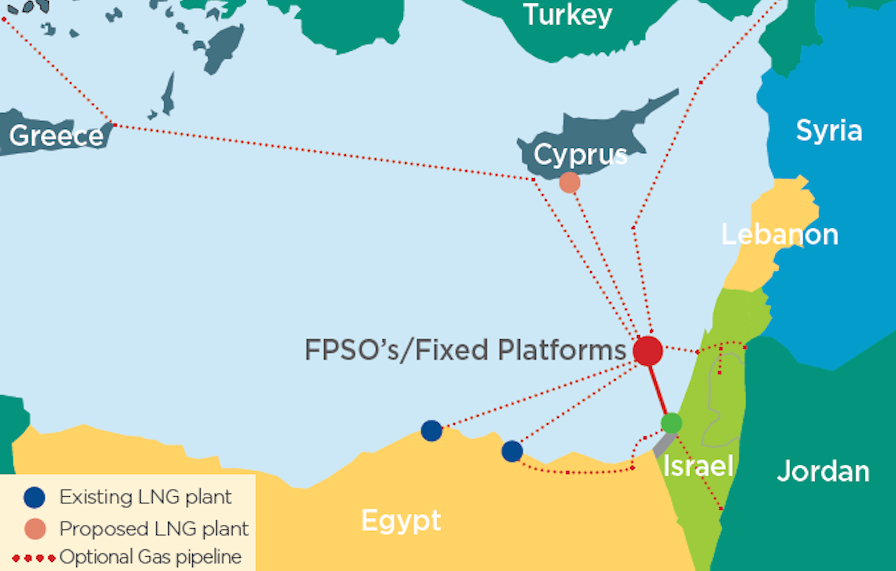After years of delay, Israel is embarking on its largest-ever infrastructure project with development of the huge Leviathan offshore gas field in the Mediterranean. The first phase involves an initial investment of $4 billion to produce 12 billion cu meters of gas annually for domestic customers as well as, initially, Jordanian, Palestinian and Egyptian markets.
But that is just the beginning. The eventual investment in Leviathan and related export gas pipeline projects could surpass $10 billion or more, with further possible customers in Turkey and Europe.
In recent weeks, the Leviathan partners—Houston-based Noble Energy Inc., Israel’s Delek Group and Ratio Oil Exploration—have been lining up financing from foreign financial institutions, including JP Morgan and HSBC.
The Leviathan consortium has signed deals with Jordan’s National Electric Power Co. and two Israeli customers, with a third reportedly due to be announced in the coming days. Delek has said there are talks with more than a dozen domestic and foreign customers, and deals are expected to be signed in the coming weeks.
The companies are moving to develop the offshore field since they settled, earlier this year, government antitrust concerns that had stalled the project. Gas is projected to start pumping by 2019, says Bloomberg.
Houston-based engineer Wood Group Mustang last July won the first major project contract, a $120-million front-end engineering-and-design award.
The first phase of Leviathan’s development includes the drilling of eight production wells, which are to be linked to an offshore production-and-treatment platform and, from there, by undersea pipeline to two entry points along Israel’s central coast. “About 60% of the project has already been finalized, including much of the procurement,” said Yossi Abu, CEO of Delek Drilling. Two hundred engineers currently are working on the detailed planning of the offshore platform, he added. The Leviathan partners have committed to beginning commercial production at the end of 2019.
Noble is believed to be considering selling 10% of its stake in Leviathan to raise funds for development, according to Israeli media reports, but the company has not commented on this. Noble owns close to a 40% share of the field, with Delek units owning 44%. Noble sold stakes in smaller, nearby fields for about $438 million, said Israel newspaper Haaretz.
A second phase to expand production to 21 billion cu m per year at a cost of $2.5 billion will depend on potential export deals with Turkey, Egypt and southern European countries. “A pipeline to Turkey could be operational by the time commercial production begins,” predicted Yuval Steinitz, Israel’s energy and water minister, at a recent energy conference in Tel Aviv.
Talks are already underway with Turkey following the thaw in relations between the two countries after a six-year freeze.
The Israeli energy minister last month met in Istanbul with his Turkish counterpart, Berat Albaryrak, to discuss future gas shipments to Turkey and possibly to Europe using existing networks.
The gas would be transported via a 500-kilometer-long undersea pipeline from the Leviathan field to Turkey's southern Mediterranean coast. An initial cost estimate of the pipeline is $2 billion. Israeli energy sources said the state-owned Eilat to Ashkelon Pipeline Co. is set to complete in March a technical planning and economic analysis of the proposed pipeline.
In addition to sales to the Egyptian domestic market, discussions have resumed on possible gas shipments from both the Leviathan and the neighboring Tamar fields to two largely idle LNG plants on Egypt’s Mediterranean coast (see map). This plan would entail construction of a 450-km-long pipeline. The LNG plants are owned by Shell and Spain’s Union Fenosa.
An even more ambitious plan proposes building a 1,300-km pipeline that would transport gas from the Leviathan field and a nearby, newly discovered field off the coast of Cyprus to Cyprus itself and Greece. Then, it would link up with existing transmission lines to Italy.
A feasibility study conducted by IGI-Poseidon for the European Commission estimated the cost at $5.7 billion, but the report found that total would be substantially less than an offshore LNG plant. “Israel views gas exports to Europe as important from a strategic point of view,” said Chen Herzog, chief economist and energy expert at BDO Consulting of Tel Aviv.
But Herzog added that the pipeline to Greece likely would depend on the discovery of more gas at sites off the coast of Israel. In mid-November, the energy and water ministry issued tenders for 24 more offshore blocks, located adjacent to existing discoveries, as part of an effort to attract international energy companies to its offshore waters.
“The Israeli economy will benefit as, up to now, it has faced constraints on gas supplies. Once Leviathan is on line, there will be sufficient supplies to meet the rapidly expanding demand as well as substantial quantities for export,” said Herzog. Israel’s balance of payments will go further into surplus, and the industrial sector will benefit from a competitive advantage, he noted.
The Tel Aviv stock exchange has reacted positively to the latest developments regarding Leviathan, and the Israeli partners—Delek Group and Ratio—have been able to easily raise the necessary funds for development.


